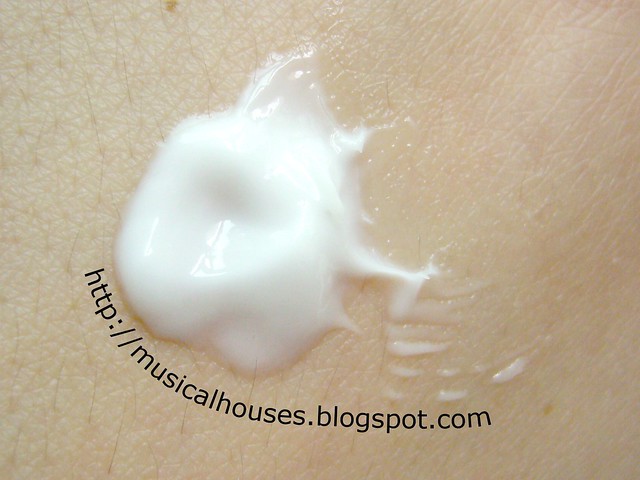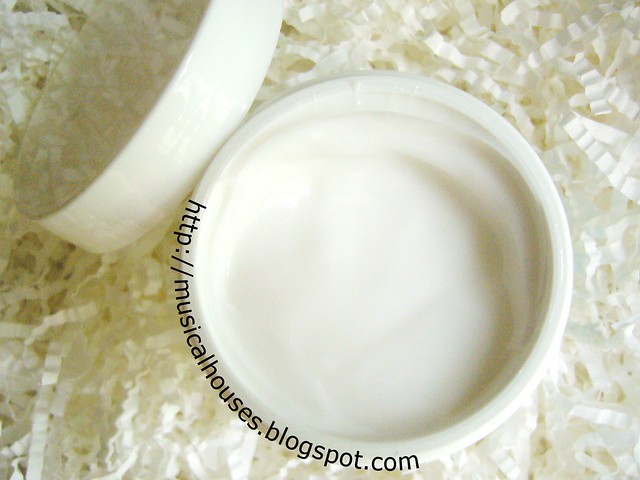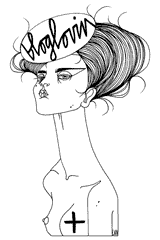I did say the Kiehl's ULtra Facial Cream is famous. The moisturizer is known to provide 24-hour hydration, and in fact, Kiehl's partnered with adventure explorer and polar guide Doug Stoup, on his recent expedition to the North Pole in the Arctic Ocean. So if it is the cream of choice for someone making an expedition to the North Pole, it's gotta be good, right?

Explorer Doug Stoup uses Kiehl's Ultra Facial Cream! If it works for him in the North Pole, it would probably work on me too! (Kiehl's website)
Because of the Ultra Facial Cream's reputation for being used by explorer to the North Pole and such, when I tried the Ultra Facial Cream, I expected it to be all thick and heavy and greasy. But to my surprise, it wasn't. In fact, it fared much better than I expected!
The Kiehl's Ultra Facial Cream is actually a pretty lightweight cream that could be used for everyday. For a cream, it sinks in fairly fast and did not leave much residue behind. While it's certainly substantial enough to be used as a night cream if you so desire, it also works well as a day cream used under makeup. I've tried it both as a day and night cream, and was happy with it either way. It also seems a little thinner than some of the other Kiehl's creams I've tried (I'm thinking of the Powerful Wrinkle and Pore Reducing Cream, actually). Also, the Ultra Facial Cream has no fragrance, which is great.

Kiehls Ultra Facial Cream: Heavy on the moisturization, light-feeling on the skin
The ingredients for the Ultra Facial Cream are also really great if you're looking to moisturize your skin. The key ingredients are water, of course, as well as Glycerin, a very useful humectant in skincare. Other than that, there are ingredients that help to moisturize the skin. These include Squalane, another excellent moisturizing ingredient, Bis-PEG-18 Methyl Ether Dimethyl Silane, which despite its long name is actually an ingredient that helps with moisturizing the skin, and improving the texture of the cream, Sucrose Stearate, another emollient, and Stearyl Alcohol, which despite the "alcohol" in its name is actually not drying to skin - it's a fatty alcohol, which helps to moisturize the skin. (Just clearing up that bit of misinformation which seems to be aggressively lobbied for in some parts of the Internetz. Not all alcohols are drying, fatty alcohols have a different chemical structure so they behave differently and are moisturizing to the skin.) And because so many emollients in the cream mean it could be pretty heavy-feeling, there's also Cyclohexasiloxane, which helps give the otherwise-would-be-quite-thick cream a more spreadable texture. So yes, the Ultra Facial Cream is packed with lots of humectants and emollients, to give you great hydration, while still feeling light on the skin.
As Kiehl's advertises, there are also some plant extracts, the main ones being Prunus Armeniaca Kernel Oil, Phenoxyethanol, Persea Gratissima Oil, Olea Europaea Fruit Oil, and Oryza Sativa Bran Oil. Those are great additions as natural moisturizers too.

Kiehl's Ultra Facial Cream ingredient list: Useful, heavy-duty ingredients include glycerin, squalane, and other skin-moisturizing heavyweights.
The best part about trying out Kiehl's products is that Kiehl's has a 100% satisfaction and money-back guarantee to our customers, within 28 days of purchase! I only recently knew about this as Kiehl's is currenty more aggressive in getting hte word out, so I thought I'd share this with you guys! I know, I know, I really should have mentioned this right at the beginning of the post. But better late than never, right? So now you get to try some of the products I've been pleased by and think work, with a money-back guarantee!

Kiehl's Ultra Facial Cream: Now easier to try with the money-back guarantee!
So if you're looking for a cream that offers great hydration with a solid, tried-and-tested-and-loved formula, and if you're looking for a value-for-money purchase that's effective, then this is worth checking out. After all, for the price you pay, you do get a tub that will last a long time (I always seem to go through my Kiehl's products slower than other brands!), and for the kind of formula you get in the Kiehl's Ultra Facial Cream, the price is fair. I could definitely imagine another more high-end brand using a near-identical formula, while bumping up the price by a few more fifties. Because there isn't any fragrance, it's likely to work well even if you have somewhat sensitive skin, too. So yes, I do think this cream is pretty good, and if you're angling to try it, the money-back guarantee can't hurt, either!
(Product was sent for review. Review is my complete and honest opinion. I am not affiliated with/compensated by the company.)














This is now my holy grail night cream for winter, as I'm so dehydrated and dry (with serums underneath, though). Just ordered my third jar, and am getting the big 125ml on this time as I keep repurchasing :-)
ReplyDeleteI have been wanting to try this cream but I was worried that it would be too heavy for me. Thank you for your review my dear, I'll go check this out after I have finished my night cream.
ReplyDeleteI really like how you break down and explain the ingredients!
ReplyDeleteVoyageOfTheMeeMee
i noticed there were parabens in it and was wondering whether you knew more about the parabens controversy. i've always wondered if all parabens are cancerous and bad for you, or is that just misinformation. is there a reason why do beauty products use them so often, maybe for certain properties and purposes it serves? just asking your opinion on the matter if you might happen to know more about it than the rest of us, thanks for the review :)
ReplyDelete@Anonymous: Yes, you are right. There are two parabens in the product, methyl paraben and propylparaben. And yes, I too have heard all about the paraben controversy, and to be honest, am getting a little tired of all the misinformation, half-truths, and fearmongering out there. The truth is, if you look at the amount if hoopla online in certain parts of the Internetz, versus the actual scientific data on parabens, you'll find that there is very little to justify the hoopla. Since Blogger has a limit on the length of comments, I'm going to break my reply up into a few parts, since I figure you'd probably want all the details rather than a summary.
DeleteFirst, a little overview on what are parabens. Parabens are preservatives that are added to cosmetic products to prevent microbial growth, which most commonly happens after a product is opened and the consumer starts using it (because when you open a jar of cream and stick your fingers in it, germs and other forms of life can get inside and start to breed). The level of preservatives used in cosmetic and skincare products is usually less than 1% (so very small amounts). Parabens are also allowed for use in food, also in limited amounts, although we won't go into that here because this is a beauty blog. But just a little tidbit of info.
Now that we've established what parabens are, what does the existing scientific data say about them? Here is where we really cut through the hype. Contrary to some of the really aggressive misinformed opinions out there on the Internetz, parabens actually have a good track record of safety as far as their use in cosmetics is concerned. The US Cosmetic Ingredient Review (CIR) has actually reviewed the safety of parabens at least 2 or 3 times (most recently being a few years back), and each time the conclusion is that parabens are safe. The European Commission and the Japanese regulatory authorities have all also looked at the safety of parabens and found them to be safe, and all three allow parabens to be used in cosmetics in small quantities as a preservative. (As a matter of fact, all three governing bodies also allow parabens for use in food, too, so it seems a little unfair to single out parabens in cosmetics for selective bashing, although that is what we see today.)
@Anonymous: Here's part 2!
DeleteSo, if parabens are safe, why all the hype? Most people who dislike parabens believe that parabens cause breast cancer. This view is actually derived from a bit of misinformation with lots of fearmongering thrown in. This view comes from a 2004 study (abstract here: http://onlinelibrary.wiley.com/doi/10.1002/jat.958/abstract ) where scientists took breast tissue from 20 women, and found that there were parabens in the breast tissue. This study was not conclusive by any means because 1) the researchers didn't look at paraben levels in breast tissue that wasn't cancerous (after all, water is in cancerous breast tissue too, but it doesn't cause breast cancer! So without comparing against cancer-less tissue, we can't draw any conclusions, and 2) the authors are not able to prove that parabens actually caused the cancer (correlation is not the same as causation). But people twist the results and selectively misinterpret them, and the vast majority of "omgz parabens cause cancer" type of online views are written as though the authors have proven that parabens cause cancer. It is a deliberate misinterpretation of the results, and a lot of misdirected hype. If we actually look at what the original study's authors conclude from their own results, they don't even claim that parabens cause breast cancer, only that there are parabens in breast tissue and this needs further study: "These studies demonstrate that parabens can be found intact in the human breast and this should open the way technically for more detailed information to be obtained on body burdens of parabens and in particular whether body burdens are different in cancer from those in normal tissues." (In other words, scientist-speak for "We've noticed that this exists, but we don't know why or how and we can't say anything about it. So it needs more study.") This is very different from what you read on those Internetz sites which act as though parabens have been proven to cause cancer, because people misinterpreted and sensationalize the data, and often, lobbying groups like EWG and so on are less than honest in how they represent scientific studies and data. In fact, this very same study is addressed by the FDA on their website (http://www.fda.gov/cosmetics/productandingredientsafety/selectedcosmeticingredients/ucm128042.htm ) and I'm quoting from the relevant bit of the article: "A study published in 2004 (Darbre, in the Journal of Applied Toxicology) detected parabens in breast tumors. The study also discussed this information in the context of the weak estrogen-like properties of parabens and the influence of estrogen on breast cancer. However, the study left several questions unanswered. For example, the study did not show that parabens cause cancer, or that they are harmful in any way, and the study did not look at possible paraben levels in normal tissue. FDA is aware that estrogenic activity in the body is associated with certain forms of breast cancer. Although parabens can act similarly to estrogen, they have been shown to have much less estrogenic activity than the body’s naturally occurring estrogen...Further, parabens are used at very low levels in cosmetics. In a review of the estrogenic activity of parabens, (Golden et al., in Critical Reviews in Toxicology, 2005) the author concluded that based on maximum daily exposure estimates, it was implausible that parabens could increase the risk associated with exposure to estrogenic chemicals." So as you can see, both the FDA and the authors of the original study are not able to make any links between paraben use and breast cancer.
@Anonymous: And here's part 3!
DeleteAs a matter of fact, the vast majority of scientific studies available reaffirm the safety of parabens. You can get a neatly summarized overview of the other studies done in the CIR reviews here: http://www.cir-safety.org/sites/default/files/paraben_build.pdf - it is a very long document, but lists virtually every study on parabens done to date, so it is very useful as an overview. So as you can see, the vast majority of scientific data shows that parabens are not harmful as they are used today (i.e. used in small quantities in cosmetics and food), and all the major governing bodies have looked at this data and have concluded that parabens as used today are safe. Yet, there is so much misinformation and fearmongering going on just based on one single study done almost 10 years ago that doesn't even show any link between parabens and breast cancer (or any other form of cancer, for that matter). So this is exactly what I meant when I said that the established safety data on parabens doesn't warrant the current hoopla about them - it seems to me like the hysteria and fearmongering just got out of hand, especially because most people who hold this viewpoint don't seem to fact-check against actual scientific data.
Now that we have looked at paraben safety, we can answer your other question - why are parabens in our products? The reason why parabens are sill in our cosmetics (other than the fact that they're actually safe and non-irritating to skin) is because parabens are very effective at killing microbes, thus making them the best choice for preservatives out there. There are paraben alternatives (and you see these in other products), but generally, they don't do as good a job as parabens, and have some side effects. Ironically, it seems to me that the very people who are pushing for parabens to be removed from our cosmetic and skincare products, supposedly in the name of safety, are actually making our products less safe, simply because you're removing a perfectly fine ingredient that has been justified by all the available scientific data, and replacing it with other ingredients that may not be as effective or safe. For more info on paraben alternatives, you can take a look at another excellent science-based beauty site here, where the author writes about the effectiveness of paraben substitutes here: http://www.futurederm.com/2012/11/27/are-paraben-alternatives-actually-better/
@Anonymous: Here's part 4!
DeleteSo to sum up - my view is that based on all the available actual scientific data I've seen, parabens are safe as used today, have very low irritation potential to the skin, and are effective microbe killers and preservatives. Particularly for cosmetics and skincare, given that they are used in such small quantities (less than 1%), my conclusion is that there is no cause for worry, despite all the fearmongering on the Internet. If anything, those concerned about parabens should look at their food, where you actually ingest parabens, rather than picking on skincare and cosmetics. It's your choice to come to your own conclusion and hold your views, but I always strongly prefer being able to base my views on scientific evidence, rather than twisting the science to fit my unjustified viewpoint. That was a long comment, but I hope it helps!
Anyway, I've included some more references and info on parabens and their safety, because I know that a google search often throws up all the fearmongering sites, making it hard to find the reliable sources of information. Some of these sites are already mentioned in my reply above, but all of them are useful information:
1. US CDC article on paraben safety: http://www.cdc.gov/biomonitoring/Parabens_BiomonitoringSummary.html
2. US CDC paraben fact sheet: http://www.cdc.gov/biomonitoring/pdf/Parabens_FactSheet.pdf
3. Info on the FDA's website on parabens as found in cosmetics: http://www.fda.gov/cosmetics/productandingredientsafety/selectedcosmeticingredients/ucm128042.htm
4. News summary of CIR's stand on parabens: http://prnewswire.com/news-releases/cosmetic-ingredient-review-cir-expert-panel-reaffirms-the-safety-of-parabens-used-in-cosmetics-and-personal-care-products-141750543.html
5. Full summary of the decision made by the CIR on parabens. It is referred to in the press release above, and is super long but quite useful as it goes into detail on what exactly are parabens and contains a summary of the scientific literature on parabens to date. If you have some chemistry background you will also appreciate their in-depth look at the properties of parabens: http://www.cir-safety.org/sites/default/files/paraben_build.pdf
6 A summary of the European Commission's stance on parabens: http://ec.europa.eu/health/scientific_committees/consumer_safety/docs/sccs_o_041.pdf
That was a loong comment, but I hope this helps! And thank you for asking your question, I am happy that you thought to look up more info rather than just blindly believing the misdirected hype. It's what makes the comments on my blog so rewarding to respond to!
Wow I didn't ask you this question but am so impressed by your answer! Thanks so much for the useful answer! :) I'm very tempted to buy the ultra cream now
DeleteHi dear, how much will this product cost?
ReplyDeleteThanks
@Anonymous: It is S$52. Hope this helps!
Deletei always really likes ur review..so scientific, not just based on your opinion only, but you do some research, :)
ReplyDeletenice
Thank you so much for your very informative review on the product. I have been using kiehl's and was slightly shaken by the fear of paraben.Keep up the good work!!
ReplyDeleteHi,
ReplyDeleteI would like to know your opinion about this post: http://www.truthinaging.com/review/kiehls-ultra-facial-cream-reviewed-and-rejected-2.
I've recently bought this product, but the oil-free version, and after reading that I've honestly started to consider getting rid of it. What do you think? Thanks.
While you're busy shouting about parabens you're missing on the real threat here. Phenoxyethanol is a known neurotoxin, Chlorphenesin is another neurotoxin banned in Japan, and studies have shown that Triethanolamine causes mutations in sense organs (eyes, ears, nose) in animals.
ReplyDeleteTake of this what you will, but I personally wouldn't touch this product with ten-foot pole.
Links and sources
Deletehi this porduct contains chlorophenesin which is banned in japan and phenoxyethanol which i heard are both toxic? just wondering if all this is true i bought some kiehls products and want to know if its safe. great review btw! :)
ReplyDeleteAny updates on this comment? I am wondering the same and hesitating to buy this product.
DeleteI am a big fan of Khiel's kindly update more as I would like to know as much as Qiqi Lau above. Even people keep saying it's toxic but that's the cream I find most effective what an orony..the rest I can't see much improvement even after a bottle used.
ReplyDeleteI really like your writing style, fantastic info, thank you for posting :D.
ReplyDelete